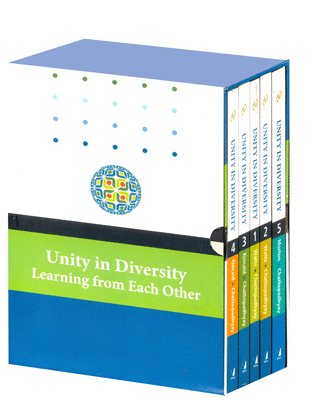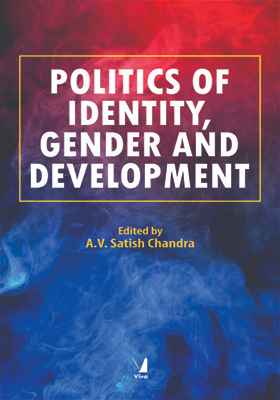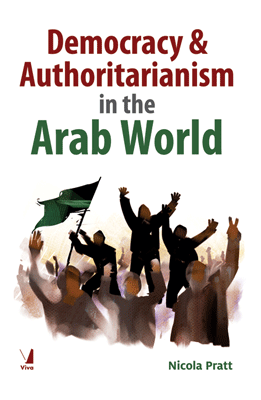
Unity in Diversity: Learning from Each Other (5 vol set)
Unity in Diversity: Learning from Each Other (5 vol set)
₹1,615.50 ₹1,795.00 Save: ₹179.50 (10%)
Go to cartISBN: 9788130912011
Bind: Paperback
Year: 2009
Pages: 832
Size: 140 x 216 mm
Publisher: Viva Books Originals
Sales Territory: Worldwide
THE SERIES:
In the contemporary world, Federalism as a political idea has become increasingly important as a way of peacefully reconciling unity and diversity within political systems. Federalism has grown in importance, in part because modern developments in transportation, social communications, technology, industrial organization, globalization and knowledge-based societies have all contributed to simultaneous needs for both larger and smaller political units.
By combining elements of shared rule in larger units and self-rule in smaller regional units, federal political systems provide the closest institutional approximation to the complex multicultural and multidimensional economic, social and political reality of the contemporary world.
Among federations, the magnitude of India's diversity and its achievement of an encompassing unity stand out, although partition into the Dominion of India and the Dominion of Pakistan, along with some population exchanges, were required at the time of independence in 1947, and certain intergroup conflicts have persisted since independence. There are more linguistic variations in India than in any other federation on the globe. Also there is an enormous range of other forms of diversity. Four of the world's major religions —Hinduism, Buddhism, Jainism and Sikhism —originated on the Indian subcontinent, and Judaism, Zoroastrianism, Christianity, and Islam arrived in India long ago.
Target Audience:
Departments of political science, international studies/affairs, institutes of public administration/governance.
Contents:
Vol 1: Building on and Accommodating Diversities
The first volume Building on and Accommodating Diversities draws attention to the extent to which diversity is not to be viewed simply as a problem but as an asset to be built upon in the process of nation-building. This volume also makes the very important point that diversity can enrich a polity. Nation-building is a necessity when the social milieu is diverse, and the various constituent groups need both identity and voice within the nation state rather than marginalization or homogenization.
Vol 2: Emerging Issues in Fiscal Federalism
The second volume Emerging Issues in Fiscal Federalism discusses the financial arrangements within a federation and how they have a significant impact on its operation. These arrangements can be especially salient and volatile in federations characterized by high levels of diversity wherein various groups are highly sensitive to who pays what and who gets what out of any given system of fiscal federalism.
Contents: Theme and Subtheme Papers • Theme Paper: Emerging issues in fiscal federalism-Anwar Shah, Indira Rajaraman and Fernando Rezende • Subtheme Paper: Assignment systems in Federations-Mahesh C. Purohit • Subtheme Paper: Managing fiscal conflicts-Paul Bernd Spahn • Subtheme Paper: Fiscal federalism and regional equity-Renuka Viswanathan • Analytical Summaries of Work Sessions • Subtheme: Assignment systems in federations • Work Sessions 4: How effective are different forms of harmonizing VAT and other Taxes? • Work Session 16: Does fiscal responsibility legislation undermine federalism?-Vishwa Nath Alok • Subtheme: Managing fiscal conflicts • Work Session 5 and 17: Fiscal equalization and fiscal conflicts are like the chicken or egg question: which came first?-Jan Werner • Subtheme: Fiscal federalism and regional equity • Work Session 6: How do federations reconcile overall economic stability with state autonomy? • Work session 18: To what extent do central governments erode state jurisdiction using fiscal arrangements?-Jose Roberto Rodrigues Afonso
Vol. 3: Interaction in a Federal System
Interaction in a Federal System takes a closer look at the unavoidability of overlaps in the responsibilities of governments within a federation, as well as the existence of culturally diverse constituent political communities in most federations. It goes on to show how intergovernmental interaction has been an important element in all federations.
Contents: Theme and Subtheme Papers • Theme Paper: Interaction in federal systesms-Balveer Arora, Beryl Radin and Cheryl Saunders • Subtheme Paper: Anticipation and Managing tension and conflict-Rajeev Dhavan • Subtheme Paper: Techniques, Structures, and Processes-Stefan Hammer • Subtheme Paper: Accountability and transparency-Paul L. Posner • Analytical Summaries of Work Sessions • Subtheme: Anticipating and managing tension and conflict • Work Session 7: How do federations deal with water disputes? • Work Session 19: How do federations coordinate policing and deal with public security?-Ajay Kumar Singh • Subtheme: Techniques, structures, and processes • Work session 8: What are the effective approaches to intergovernmental relations? • Work sessions 20: How can disasters and emergencies be effectively managed?-Carol S. Weissert • Subtheme: Accountability and transparency • Work Session 9: Can accountability and transparency be achieved where executive branches dominate intergovernmental relations? • Work Session 21: Are centralized election agencies compatible with federalism-Rekha Saxena
Vol. 4: Local Government in Federal Systems
The fourth volume Local Government in Federal Systems deals with the importance of local governments and metropolitan regions. It emphasizes local government's closeness to civil society and its role in enabling disadvantaged groups, including women, to participate in governance. The volume also looks at the differential constitutional arrangements for local governments in federal countries and highlights the complex challenges of governing megacities.
Contents: Theme and Subtheme Papers • Theme Paper: Local government in federal systems-Horst Risse, Caroline Andrew, Dalbir Singh and Suresh Keswani • Subtheme Paper: Enhancement of Democracy through empowerment of disadvantaged groups-Nico Steytler • Subtheme Paper: The functioning of local governments and their relationship with upper levels of government-George Mathew • Subtheme Paper: The functioning of local government in federal systems: Perspectives from India-Vinod Vyasulu • Subtheme Paper: Governance of megacities in federal orders-Boris Graizbord • Analytical Summaries of Work Sessions • Subtheme: Enhancement of Democracy through Empowerment of Disadvantaged groups • Work Session 10: To what extent should local governments lead in the empowerment of disadvantaged groups? • Work Session 22: Are local governments really enhancing participatory decision-making?-Arif Ali Khan • Subtheme: The functioning of local governments in federal systems • Work Session 11: Should local governments be constitutionalized? • Work Session 23: Do direct federal-local government relations undermine federalism?-Y.A. Kapur • Subtheme: Governance of megacities in federal orders • Work Session 12: How is governance and service delivery organized in megacities? • Work session 24: What forms has governance of national capital regions taken?-Robert Young
Vol. 5: Policy Issues In Federalism: International Perspectives
This volume brings together a selection of papers from the Young Professionals Programme, offering a new perspective on the themes discussed in the earlier four volumes by reflecting on future challenges in these areas.
Contents: Theme 1: building on and Accommodating diversities • Can diversity be accommodated? • The case of Ethiopia-Leulseged Tadesse • Policy as instrument for reconciling diversity • Experience of the Indian federal system-Himanshu Jha • How important is language policy as a Conflict-resolution tool? • The cases of India and Serbia-Anshu Srivastava, Miodrag A. Jovanovi • Theme 2: emerging issues in fiscal federalism • Differences in resource endowments and the impact on the Argentine education system-Luciana Diaz Frers • Are federations moving towards more rational forms of equalization? • The cases of India and Russia-Shefali Dhingra, Vladimir Nazarov • To what extent do central governments erode Subnational jurisdiction using fiscal arrangements? • Perspectives from India and Italy-Sanjay Kumar Pandey, Augusta Badriotti • Theme 3: interaction in federal systems • Intergovernmental responses to water disputes in Australia-Adam Wand • Accountability and Transparency • Challenges to executive dominance in Intergovernmental relations-Tripta Kanojia, Rachel Simeon • How do federal states deal with the need for coordinated policing and public security?-Stephen Herbert • Are centralized election management bodies suitable for federal structures?-Indraneel Datta • Theme 4: local government in federal systems • Local government leading the empowerment of disadvantaged groups • The cases of India and South Africa-Neetu Prasad, Reuben Baatjies • Democratization and decentralization in Latin America and the case of participatory budgets-Alberto Kleiman • Panchayati Raj in India • Are they really successful in participatory Decision-making?-Nupur Tiwari • The reform of federal-local relations in Germany-Hendrik Hagemann.
This set of five handsomely produced volumes deal with significant issues in contemporary federations and would be of interest to those working in all federations, old and new: practitioners, teachers and students of federalism and forms of government, and scholars. Each volume deals with the overall theme of the reconciliation of diversity and unity.
Vol 1: Building on and Accommodating Diversities
The first volume Building on and Accommodating Diversities draws attention to the extent to which diversity is not to be viewed simply as a problem but as an asset to be built upon in the process of nation-building. This volume also makes the very important point that diversity can enrich a polity. Nation-building is a necessity when the social milieu is diverse, and the various constituent groups need both identity and voice within the nation state rather than marginalization or homogenization.
Vol 2: Emerging Issues in Fiscal Federalism
The second volume Emerging Issues in Fiscal Federalism discusses the financial arrangements within a federation and how they have a significant impact on its operation. These arrangements can be especially salient and volatile in federations characterized by high levels of diversity wherein various groups are highly sensitive to who pays what and who gets what out of any given system of fiscal federalism.
Contents: Theme and Subtheme Papers • Theme Paper: Emerging issues in fiscal federalism-Anwar Shah, Indira Rajaraman and Fernando Rezende • Subtheme Paper: Assignment systems in Federations-Mahesh C. Purohit • Subtheme Paper: Managing fiscal conflicts-Paul Bernd Spahn • Subtheme Paper: Fiscal federalism and regional equity-Renuka Viswanathan • Analytical Summaries of Work Sessions • Subtheme: Assignment systems in federations • Work Sessions 4: How effective are different forms of harmonizing VAT and other Taxes? • Work Session 16: Does fiscal responsibility legislation undermine federalism?-Vishwa Nath Alok • Subtheme: Managing fiscal conflicts • Work Session 5 and 17: Fiscal equalization and fiscal conflicts are like the chicken or egg question: which came first?-Jan Werner • Subtheme: Fiscal federalism and regional equity • Work Session 6: How do federations reconcile overall economic stability with state autonomy? • Work session 18: To what extent do central governments erode state jurisdiction using fiscal arrangements?-Jose Roberto Rodrigues Afonso
Vol. 3: Interaction in a Federal System
Interaction in a Federal System takes a closer look at the unavoidability of overlaps in the responsibilities of governments within a federation, as well as the existence of culturally diverse constituent political communities in most federations. It goes on to show how intergovernmental interaction has been an important element in all federations.
Contents: Theme and Subtheme Papers • Theme Paper: Interaction in federal systesms-Balveer Arora, Beryl Radin and Cheryl Saunders • Subtheme Paper: Anticipation and Managing tension and conflict-Rajeev Dhavan • Subtheme Paper: Techniques, Structures, and Processes-Stefan Hammer • Subtheme Paper: Accountability and transparency-Paul L. Posner • Analytical Summaries of Work Sessions • Subtheme: Anticipating and managing tension and conflict • Work Session 7: How do federations deal with water disputes? • Work Session 19: How do federations coordinate policing and deal with public security?-Ajay Kumar Singh • Subtheme: Techniques, structures, and processes • Work session 8: What are the effective approaches to intergovernmental relations? • Work sessions 20: How can disasters and emergencies be effectively managed?-Carol S. Weissert • Subtheme: Accountability and transparency • Work Session 9: Can accountability and transparency be achieved where executive branches dominate intergovernmental relations? • Work Session 21: Are centralized election agencies compatible with federalism-Rekha Saxena
Vol. 4: Local Government in Federal Systems
The fourth volume Local Government in Federal Systems deals with the importance of local governments and metropolitan regions. It emphasizes local government's closeness to civil society and its role in enabling disadvantaged groups, including women, to participate in governance. The volume also looks at the differential constitutional arrangements for local governments in federal countries and highlights the complex challenges of governing megacities.
Contents: Theme and Subtheme Papers • Theme Paper: Local government in federal systems-Horst Risse, Caroline Andrew, Dalbir Singh and Suresh Keswani • Subtheme Paper: Enhancement of Democracy through empowerment of disadvantaged groups-Nico Steytler • Subtheme Paper: The functioning of local governments and their relationship with upper levels of government-George Mathew • Subtheme Paper: The functioning of local government in federal systems: Perspectives from India-Vinod Vyasulu • Subtheme Paper: Governance of megacities in federal orders-Boris Graizbord • Analytical Summaries of Work Sessions • Subtheme: Enhancement of Democracy through Empowerment of Disadvantaged groups • Work Session 10: To what extent should local governments lead in the empowerment of disadvantaged groups? • Work Session 22: Are local governments really enhancing participatory decision-making?-Arif Ali Khan • Subtheme: The functioning of local governments in federal systems • Work Session 11: Should local governments be constitutionalized? • Work Session 23: Do direct federal-local government relations undermine federalism?-Y.A. Kapur • Subtheme: Governance of megacities in federal orders • Work Session 12: How is governance and service delivery organized in megacities? • Work session 24: What forms has governance of national capital regions taken?-Robert Young
Vol. 5: Policy Issues In Federalism: International Perspectives
This volume brings together a selection of papers from the Young Professionals Programme, offering a new perspective on the themes discussed in the earlier four volumes by reflecting on future challenges in these areas.
Contents: Theme 1: building on and Accommodating diversities • Can diversity be accommodated? • The case of Ethiopia-Leulseged Tadesse • Policy as instrument for reconciling diversity • Experience of the Indian federal system-Himanshu Jha • How important is language policy as a Conflict-resolution tool? • The cases of India and Serbia-Anshu Srivastava, Miodrag A. Jovanovi • Theme 2: emerging issues in fiscal federalism • Differences in resource endowments and the impact on the Argentine education system-Luciana Diaz Frers • Are federations moving towards more rational forms of equalization? • The cases of India and Russia-Shefali Dhingra, Vladimir Nazarov • To what extent do central governments erode Subnational jurisdiction using fiscal arrangements? • Perspectives from India and Italy-Sanjay Kumar Pandey, Augusta Badriotti • Theme 3: interaction in federal systems • Intergovernmental responses to water disputes in Australia-Adam Wand • Accountability and Transparency • Challenges to executive dominance in Intergovernmental relations-Tripta Kanojia, Rachel Simeon • How do federal states deal with the need for coordinated policing and public security?-Stephen Herbert • Are centralized election management bodies suitable for federal structures?-Indraneel Datta • Theme 4: local government in federal systems • Local government leading the empowerment of disadvantaged groups • The cases of India and South Africa-Neetu Prasad, Reuben Baatjies • Democratization and decentralization in Latin America and the case of participatory budgets-Alberto Kleiman • Panchayati Raj in India • Are they really successful in participatory Decision-making?-Nupur Tiwari • The reform of federal-local relations in Germany-Hendrik Hagemann.
This set of five handsomely produced volumes deal with significant issues in contemporary federations and would be of interest to those working in all federations, old and new: practitioners, teachers and students of federalism and forms of government, and scholars. Each volume deals with the overall theme of the reconciliation of diversity and unity.
About the Editors:
John Kincaid is the Robert B. and Helen S. Meyner Professor of Government and Public Service and Director of the Meyner Center for the Study of State and Local Government at Lafayette College, Easton, Pennsylvania. He also is Senior Editor of the Global Dialogue on Federalism, a joint project of the Forum of Federations and International Association of Centers for Federal Studies, and an elected fellow of the National Academy of Public Administration. He received the Distinguished Scholar Award from the Section on Federalism and Intergovernmental Relations of the American Political Science Association and the Distinguished Scholar Award from the Section on Intergovernmental Administration and Management of the American Society of Public Administration. He has served as Editor of Publius: The Journal of Federalism and Executive Director of the US Advisory Commission on Intergovernmental Relations, Washington, DC. He has written various works on federalism and intergovernmental relations, and is co-editor of Constitutional Origins, Structure, and Change in Federal Countries (2005).
Rupak Chattopadhyay is Senior Director, Global Programs and Head, International Conferences at the Forum of Federations. In this capacity, he was Adviser to the Chairman of the organizing committee of the 4th International Conference on Federalism. He was Director of Asia-Pacific Programs at the Forum, and was closely involved with the peace process in Sri Lanka and discussions on constitutional reforms in the Philippines. He has worked as policy adviser to various commercial and industrial houses in India, Africa and Europe. He has a master's degree in Economics and Political Science from the University of Ottawa and the University of Illinois (Urbana?Champaign) and did his doctoral studies in Political Science at the University of Toronto. He is also a member of the Consultative Group on the Study of the Intergovernmental relations and dispute resolution mechanisms, Inter-State Council, Government of India.
Paul Morton studied political science, economics and international affairs in Toronto and Ottawa. From 2001 to 2005 he was the Programme Manager for Africa with the Forum of Federations in Ottawa, before returning to study law in the UK. He is currently training as a solicitor with a law firm in Edinburgh.
Ronald L. Watts is Principal Emeritus, Professor Emeritus of Political Studies and Fellow of the Institute of Intergovernmental Relations at Queen's University, where he has been a member of the academic staff since 1955. He was Principal and Vice- Chancellor of Queen's University 1974-1984. From 1988 to 1993, he was Director of the Institute of Intergovernmental Relations at Queen's University. As a scholar, Ronald Watts has worked for over forty years on the comparative study of federal systems and Canadian federalism, subjects on which he has written or edited twenty books, monographs and reports and over eighty articles in journals and chapters in books. He was a Commissioner on the Task Force on Canadian Unity (Pepin-Robarts), 1978-79, and a consultant to the federal government during the constitutional negotiations in 1980. In June 1990 he was an advisor to Premier Peterson of Ontario during the discussions over the Meech Lake Accord. From April 1991 to September 1992 he was Assistant Secretary to the Cabinet for Constitutional Development (Federal- Provincial Relations Office) with the Government of Canada.






